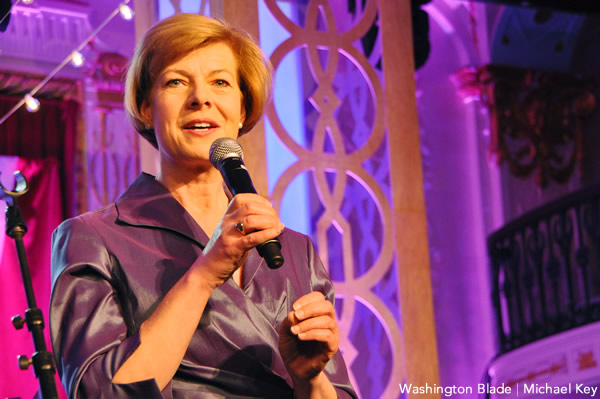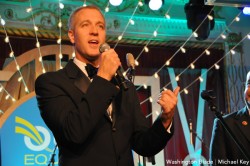National
Gays just wanted to have fun at HRC ball
LGBT advocates, buoyed by inaugural speech, celebrate 2nd term


Sen. Tammy Baldwin (D-Wisc.) speaks at HRC’s inaugural celebration (Washington Blade photo by Michael Key)
The official start of President Obama’s second term was cause for excitement on Monday at the Human Rights Campaign’s “Out for Equality” inaugural ball.
A jubilant crowd of about 1,500 donned tuxedos and designer duds after Obama was sworn into office by Chief Justice of the Supreme Court John Roberts and the inaugural parade. They braved the cold night to gather at D.C.’s Mayflower Hotel, which sported a rainbow flag above its front entrance.

Audra McDonald (Washington Blade photo by Michael Key)
Entertainment included Audra McDonald, a five-time Tony Award winner, and Will Swenson, a Tony nominated actor known for his roles in “Priscilla Queen of the Desert” and “Hair.” Ending the celebration was gay icon Cyndi Lauper, a longtime HRC supporter, who closed the night with a rendition of “Girls Just Want to Have Fun.” Chris Matthews, host of MSNBC’s “Hardball,” also made an appearance.
A number of high-profile pro-LGBT figures made appearances. At one point the stage featured Sen. Al Franken (D-Minn.,) the leader on anti-bullying legislation in the Senate; New Hampshire Gov. Maggie Hassan, whose recent election assured the preservation of marriage equality in her state; and Newark Mayor Cory Booker, a rising Democratic star considering a bid to represent New Jersey in the U.S. Senate.
But the political star who received the most attention during the ball was lesbian Sen. Tammy Baldwin (D-Wis.), who called for a toast to Obama in response to LGBT references in his inaugural address after Human Rights Campaign President Chad Griffin introduced her on stage.
“I was so struck in the passage about going from Seneca Falls to Selma to Stonewall — all of us working so hard to advance true equality, but all woven into the small fabric of our American story,” Baldwin said.
Baldwin declined to take questions from the Washington Blade after her remarks.
As he shook hands with supporters, Booker took a question from the Blade about the prospects of legalizing same-sex marriage in New Jersey. The Democratic legislature last year passed marriage legislation, but Gov. Chris Christie vetoed it.
“It’s still not a matter of not if, but when,” Booker said. “But that doesn’t mean that we shouldn’t be pushing and working for it every single day. So, hopefully we can still override the governor’s veto, or frankly, in the next election in November, bring in a governor who shares the values of the majority of the state of New Jersey that will stand up for marriage equality.”
But the buzz during the party was the inaugural speech Obama delivered a few hours earlier in which he twice included the LGBT community by including the 1969 Stonewall riots in his speech.
“Our journey is not complete until our gay brothers and sisters are treated like anyone else under the law – for if we are truly created equal, then surely the love we commit to one another must be equal as well,” he also said.
It was the first time a U.S. president had ever addressed the LGBT community in an inaugural address.
Rep. Sean Patrick Maloney (D-N.Y.), the newly seated gay U.S. House member, was among those who praised Obama’s speech and said he “became emotional” listening to the president deliver his remarks on LGBT rights.

Rep. Sean Patrick Maloney (D-N.Y.) (Washington Blade photo by Michael Key)
“I’ve never been more proud of an American president,” Maloney said. “I thought about my kids and I brought my kids who are African American to watch the president because I wanted them to understand that anyone can do anything in this country, but I never imagined that they would also get a lesson on how we’re all equal regardless not just of race, but sexual orientation and to receive that lesson from the president was beautiful and remarkable.”
Gay Democratic lobbyist Steve Elmendorf also had high praise for Obama’s decision to include LGBT references in his inaugural address, calling it “historic.”
“It was surprising, I guess,” Elmendorf said. “We know where he is, but at an inaugural event, nobody has ever said ‘gay’ at an inaugural. Nobody has ever done such a good job of making the case about how the gay rights movement, sort of follows from the women’s rights movement and civil rights movement and put it all together. There were not a lot of dry eyes among the gays watching that speech.”
Corey Johnson, a gay New York City Council candidate, echoed that sentiment.
“I was pleased when Stonewall was put in the same sentence as Seneca Falls and Selma and I thought that could have been enough, but then to go on and explicitly talk about equal rights for LGBT Americans for the first time ever in an inaugural address I thought was unexpected, yet incredibly welcomed, so I was very moved actually,” Johnson said.
Michael K. Lavers contributed to this article.

The Comings & Goings column is about sharing the professional successes of our community. We want to recognize those landing new jobs, new clients for their business, joining boards of organizations and other achievements. Please share your successes with us at [email protected].
Congratulations to Gil Pontes III on his recent appointment to the Financial Advisory Board for the City of Wilton Manors, Fla. Upon being appointed he said, “I’m honored to join the Financial Advisory Board for the City of Wilton Manors at such an important moment for our community. In my role as Executive Director of the NextGen Chamber of Commerce, I spend much of my time focused on economic growth, fiscal sustainability, and the long-term competitiveness of emerging business leaders. I look forward to bringing that perspective to Wilton Manors — helping ensure responsible stewardship of public resources while supporting a vibrant, inclusive local economy.”
Pontes is a nonprofit executive with years of development, operations, budget, management, and strategic planning experience in 501(c)(3), 501(c)(4), and political organizations. Pontes is currently executive director of NextGen, Chamber of Commerce. NextGen Chamber’s mission is to “empower emerging business leaders by generating insights, encouraging engagement, and nurturing leadership development to shape the future economy.” Prior to that he served as managing director of The Nora Project, and director of development also at The Nora Project. He has held a number of other positions including Major Gifts Officer, Thundermist Health Center, and has worked in both real estate and banking including as Business Solutions Adviser, Ironwood Financial. For three years he was a Selectman, Town of Berkley, Mass. In that role, he managed HR and general governance for town government. There were 200+ staff and 6,500 constituents. He balanced a $20,000,000 budget annually, established an Economic Development Committee, and hired the first town administrator.
Pontes earned his bachelor’s degree in political science from the University of Massachusetts, Dartmouth.
Kansas
ACLU sues Kansas over law invalidating trans residents’ IDs
A new Kansas bill requires transgender residents to have their driver’s licenses reflect their sex assigned at birth, invalidating current licenses.

Transgender people across Kansas received letters in the mail on Wednesday demanding the immediate surrender of their driver’s licenses following passage of one of the harshest transgender bathroom bans in the nation. Now the American Civil Liberties Union is filing a lawsuit to block the ban and protect transgender residents from what advocates describe as “sweeping” and “punitive” consequences.
Independent journalist Erin Reed broke the story Wednesday after lawmakers approved House Substitute for Senate Bill 244. In her reporting, Reed included a photo of the letter sent to transgender Kansans, requiring them to obtain a driver’s license that reflects their sex assigned at birth rather than the gender with which they identify.
According to the reporting, transgender Kansans must surrender their driver’s licenses and that their current credentials — regardless of expiration date — will be considered invalid upon the law’s publication. The move effectively nullifies previously issued identification documents, creating immediate uncertainty for those impacted.
House Substitute for Senate Bill 244 also stipulates that any transgender person caught driving without a valid license could face a class B misdemeanor, punishable by up to six months in jail and a $1,000 fine. That potential penalty adds a criminal dimension to what began as an administrative action. It also compounds the legal risks for transgender Kansans, as the state already requires county jails to house inmates according to sex assigned at birth — a policy that advocates say can place transgender detainees at heightened risk.
Beyond identification issues, SB 244 not only bans transgender people from using restrooms that match their gender identity in government buildings — including libraries, courthouses, state parks, hospitals, and interstate rest stops — with the possibility for criminal penalties, but also allows for what critics have described as a “bathroom bounty hunter” provision. The measure permits anyone who encounters a transgender person in a restroom — including potentially in private businesses — to sue them for large sums of money, dramatically expanding the scope of enforcement beyond government authorities.
The lawsuit challenging SB 244 was filed today in the District Court of Douglas County on behalf of anonymous plaintiffs Daniel Doe and Matthew Moe by the American Civil Liberties Union, the ACLU of Kansas, and Ballard Spahr LLP. The complaint argues that SB 244 violates the Kansas Constitution’s protections for personal autonomy, privacy, equality under the law, due process, and freedom of speech.
Additionally, the American Civil Liberties Union filed a temporary restraining order on behalf of the anonymous plaintiffs, arguing that the order — followed by a temporary injunction — is necessary to prevent the “irreparable harm” that would result from SB 244.
State Rep. Abi Boatman, a Wichita Democrat and the only transgender member of the Kansas Legislature, told the Kansas City Star on Wednesday that “persecution is the point.”
“This legislation is a direct attack on the dignity and humanity of transgender Kansans,” said Monica Bennett, legal director of the ACLU of Kansas. “It undermines our state’s strong constitutional protections against government overreach and persecution.”
“SB 244 is a cruel and craven threat to public safety all in the name of fostering fear, division, and paranoia,” said Harper Seldin, senior staff attorney for the ACLU’s LGBTQ & HIV Rights Project. “The invalidation of state-issued IDs threatens to out transgender people against their will every time they apply for a job, rent an apartment, or interact with police. Taken as a whole, SB 244 is a transparent attempt to deny transgender people autonomy over their own identities and push them out of public life altogether.”
“SB 244 presents a state-sanctioned attack on transgender people aimed at silencing, dehumanizing, and alienating Kansans whose gender identity does not conform to the state legislature’s preferences,” said Heather St. Clair, a Ballard Spahr litigator working on the case. “Ballard Spahr is committed to standing with the ACLU and the plaintiffs in fighting on behalf of transgender Kansans for a remedy against the injustices presented by SB 244, and is dedicated to protecting the constitutional rights jeopardized by this new law.”
National
After layoffs at Advocate, parent company acquires ‘Them’ from Conde Nast
Top editorial staff let go last week

Former staff members at the Advocate and Out magazines revealed that parent company Equalpride laid off a number of employees late last week.
Those let go included Advocate editor-in-chief Alex Cooper, Pride.com editor-in-chief Rachel Shatto, brand partnerships manager Erin Manley, community editor Marie-Adélina de la Ferriére, and Out magazine staff writers Moises Mendez and Bernardo Sim, according to a report in Hollywood Reporter.
Cooper, who joined the company in 2021, posted to social media that, “Few people have had the privilege of leading this legendary LGBTQ+ news outlet, and I’m deeply honored to have been one of them. To my team: thank you for the last four years. You’ve been the best. For those also affected today, please let me know how I can support you.”
The Advocate’s PR firm when reached by the Blade said it no longer represents the company. Emails to the Advocate went unanswered.
Equalpride on Friday announced it acquired “Them,” a digital LGBTQ outlet founded in 2017 by Conde Nast.
“Equalpride exists to elevate, celebrate and protect LGBTQ+ storytelling at scale,” Equalpride CEO Mark Berryhill said according to Hollywood Reporter. “By combining the strengths of our brands with this respected digital platform, we’re creating a unified ecosystem that delivers even more impact for our audiences, advertisers, and community partners.”
It’s not clear if “Them” staff would take over editorial responsibilities for the Advocate and Out.
-

 Federal Government4 days ago
Federal Government4 days agoTwo very different views of the State of the Union
-

 Virginia4 days ago
Virginia4 days agoVa. activists preparing campaign in support of repealing marriage amendment
-

 Opinions4 days ago
Opinions4 days agoThe global cost of Trump’s foreign aid ideology
-

 Movies3 days ago
Movies3 days agoMoving doc ‘Come See Me’ is more than Oscar worthy













